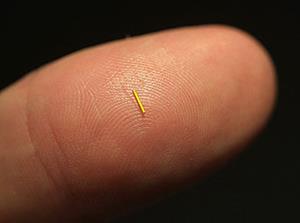Posted by: Clemson Eye in News

By Donald Glaser, MD
Clemson Eye News, April 2015
There’s some good news for patients with diabetic macular edema (DME).
Iluvien was recently approved by the FDA to treat DME. It’s an injectable micro-insert that provides sustained treatment for 36 months. The insert continuously delivers a sub-microgram dose of fluocinolone acetonide (FAc), a corticosteroid, for three years.
Myself and my fellow eye surgeons at Clemson Eye, Drs. Parisi and Johnson, are proud to be among the first ophthalmologists in the United States to offer our patients this revolutionary intravitreal injection treatment.
Iluvien is indicated for patients who have been previously treated with a course of corticosteroids and did not have a clinically significant rise in intraocular pressure.
Approximately 560,000 people in the United States are estimated to have clinically significant DME, the most frequent cause of vision loss in individuals with diabetes. One of the biggest challenges with treating DME has been the frequency of treatment. Current standard-of-care requires injections in the eye as often as monthly, and studies show that over 50 percent of these patients are not optimally managed with this regiment of treatment.1
So, Iluvien is great news for DME patients because it gives them a treatment option that lasts three years with a single injection and could actually reverse vision loss for many. Clinical trial data showed that at month 24, 28.7 percent of patients receiving Iluvien experienced an improvement from baseline in their best corrected visual acuity on the Early Treatment Diabetic Retinopathy Study (ETDRS) eye chart of 15 letters or more. This improvement was maintained through 36 months.2
Common Procedure
An intravitreal injection is the most common procedure used to treat eye disease today. A medication is injected into the vitreous space, which acts as a depot allowing small molecules to persist in the eye for weeks or months. The injection is performed in the office, is well tolerated and very safe. The eye is anesthetized (often with a topical drop) and prepped with iodine solution.
Risks are low, the primary concern being the risk of infection, with approximately one in 2000 injections resulting in some level of infection. Other risks include vitreous hemorrhage, inadvertent injury to the lens, cataract development, peripheral retinal tear, angle closure, retinal pigment epithelium tears, or uveitis.
Some History
The first intravitreal injection was the use of air for retinal detachment repair in 1911. The first drug FDA approved for injection was gancyclovir, approved in 1998 for the treatment of cytomegalovirus retinitis in patients with HIV.
Many diseases have been treated with intravitreal medications since. As the indications for treatment expanded, the number of injections increased in the early 2000s. Older treatments used FDA-approved medications, but were often used off-label for an indication different than the original approval. Triamcinolone (Kenalog) was a prime example, commonly used for diabetic macular edema.
The biggest surge in intravitreal injections, however, came from the development of anti-VEGF (vascular endothelial growth factor) drugs. These drugs have proven to be useful for the treatment of diabetic macular edema, macular degeneration and vein occlusions.
The other eye surgeons at Clemson Eye and I routinely perform these types of injections with a high level of success for our patients. Note that most health-care plans cover intravitreal injections, including Iluvien.
The care of diabetic retinopathy and age-related macular degeneration (AMD) has been revolutionized by these intravitreal injections to the point where many patients see improvements in
vision after treatment and most are at least stabilized. With the introduction of new sustained drug delivery systems, such as Iluvien, the outlook for treating and managing these serious eye conditions continues to improve.
Note that all diabetic and AMD patients should have regular dilated annual eye exams. Furthermore, any patients who complain of a loss of vision or where changes to the retina are identified should be referred to an ophthalmologist for potential treatment, which may include intravitreal injections.
Click here to view and download the PDF.
Donald Glaser, MD, is a Clemson Eye ophthalmologist specializing in comprehensive medical/surgical eye care.
1. Irv Aron’s Journal: “Iluvien Update 8: Alimera Sciences Receives FDA Approval of Iluvien for Treatment of DME”, Sept. 26, 2014 (http://irvaronsjournal.blogspot.ca/2014/09/iluvien-update-8-alimera-sciences.html).
2. pSivida Corp. Reports FDA Approval of ILUVIEN® for Diabetic Macular Edema, Sept. 26, 2014.Images © 2015 American Association of Ophthalmology